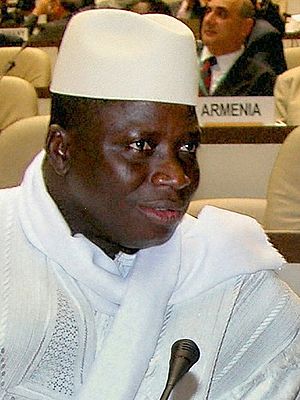| In October 2012, President Yahya Jammeh forced exchange rate down in a directive against "hoarding" but the IMF did not recognise such mandate as the Central Bank of The Gambia is responsible of regulating the financial market (Photo credit: Wikipedia) |
An
International Monetary Fund (IMF) mission to the country led by Mr. David Dunn
revealed that the recent directive by the Office of President Yahya Jammeh on
the exchange rate and shipments of U.S. dollars led to some “disruptions” in
the foreign exchange market and created “uncertainty” about The Gambia’s
exchange rate policy.
The
president’s office apparently acted “beyond powers” on October 22, 2012 when it
threatened that very drastic action will be taken against any individual or
business found culpable of foreign currency hoarding and speculating – an
operation no compromise on foreign currency hoarding it was dubbed.
It
forced the reduction of the dollar to a selling rate of D28 from D34 (the
market price at the time). The president’s office described as “all powerful”
then imposed a moratorium with immediate effect on all shipping of the US
Dollar out of the country with possible exemption for essential importation,
which must obtain prior clearance from the same office.
The
directive was withdrawn barely 15 days after it was imposed.
Now,
after a December 3-7 IMF mission to The Gambia to assess the impact of the
recent directive on exchange rate policy and operations of the foreign exchange
market, the Breton Woods institution said the CBG must assume its role.
The
IMF welcomes the recent lifting of the restrictions imposed by the directive
and the renewed commitment to a flexible, market-determined exchange rate
policy, which has helped the foreign exchange market to largely return to
normal conditions.
“Nevertheless,
full confidence will return to the market only as the Central Bank of The
Gambia (CBG), which is responsible for exchange rate policy, continues to
implement this policy framework,” Mr. Dun said.
“It
will be important that the CBG resume its gradual accumulation of international
reserves, which is key to maintaining economic stability,” he added. “To help
strengthen and further develop the foreign exchange market, the IMF stands
ready to provide technical assistance.”
The
Revised Regulations for the licensing and operation of foreign bureaus clearly
states that every bureau is free to quote its selling and buying rates. However,
the legal power to regulate the financial industry and foreign exchange
business is the responsibility of the Central Bank, not the office of the
president.
Written by Modou S. Joof







Helpful info. Fortunate me I found your web site by accident, and I'm surprised why this coincidence didn't came about earlier!
ReplyDeleteI bookmarked it.
Also visit my weblog ... http://musclefactorxreviewsite.com